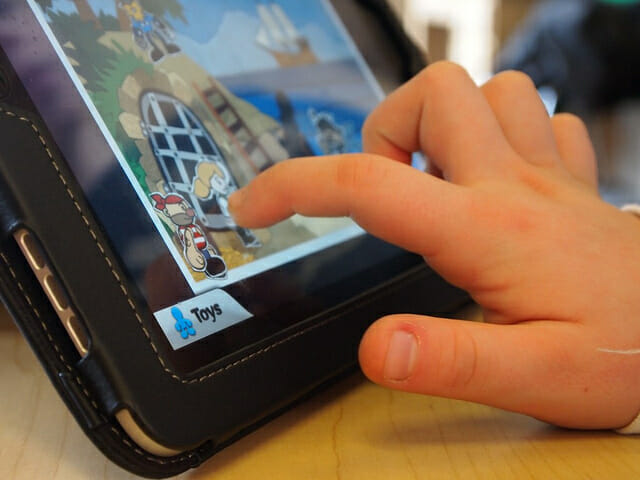What We Know About Technology and Developing Language
When children come to see me for speech therapy, it’s pretty common for me to ask, “What did you do today?” Although the responses vary, this summer (when school was out) many of them responded, “watched TV” or “played video games”. It’s no secret that electronic devices have become immensely popular over the last decade and their responses prompted me to research how the constant availability of digital media impacts language development in children.
What the Research Says
According to a survey by the American-Speech-Hearing-Association (ASHA) in 2015, 68% of two year olds and 80% of five year olds are using tablets of some sort. According to the parents surveyed, prior to age four, most parents reported their children preferred to interact with people over devices, but once children turned four, parents reported that their child’s preference switched to wanting to engage with a device along with family members. By age six, parents reported that their child preferred to play a game on a device to reading a book.
The ASHA survey also found that a majority of parents feel that the misuse of technology can be harmful to children, and over half felt their own children’s language skills were being impacted. Yet, even with these concerns, parents admitted they still use technology as a means of managing behavior or preventing tantrums. Many parents feel that the appropriate use of technology can help develop or enhance communication skills (‘appropriate’ being the key word).
For some time, studies have shown that television screen time can impact children as they get older. Some of these effects include attention problems, school difficulties, sleeping and eating disorders, and obesity. However, current research on the effects of screen time on our kids can be difficult to come by because technology is developing so quickly: science simply can’t keep up, particularly when it comes to studying the long-term effects of screens on our children.
Without Clear Research, What Should We Do?
Controlling how much screen time children are exposed to is becoming increasingly difficult because of the explosion in mobile technology and electronic media. If you, like many parents, are concerned about the impact of screen time on your kids, here are some suggestions to help technology be more of an asset than a hindrance:
- Try to engage with your child while he is using any device. For example, hold the device in your hands and try to talk as much as possible about what is happening on the screen. Almost treat it the same way as if you were reading a book to him.
- Monitor the content of what your child is watching. Try to match what she is watching with where she is developmentally, as this will help the child attach meaning to the images in front of them.
- Designate “screen free times” or “screen free zones” in which no devices are out. For example, restrict screens during meal time.
- When you are talking or playing with your child, try not to have any devices on in the background. Even if you or your child is not actively watching the screen, the noise and lights in the background still increase distraction. One article I read suggested that the number of words a parent speaks to a toddler drops by nearly 200 per hour when there is a television on in the background. This is significant because children naturally learn language simply by listening.
- Resist the urge to use technology to calm a child.
Technology can be used as a tool to help children develop language skills if used appropriately and in moderation. Exposure to screens starts to become harmful when it is excessive, when content is above what the child understands, and when it is not a platform that can be used to facilitate communication.
Human communication offers so much richness – it’s more than just words spoken aloud. It includes the nuances of tone, body language, facial expressions, and so much more. In addition, human interactions are dynamic and unpredictable. Even though there are productive ways to use technology, we should not undervalue what we can teach our children by simply talking with them.
Marissa Habeshy, M.S., CCC-SLP
Sent from my iPhone

No comments:
Post a Comment